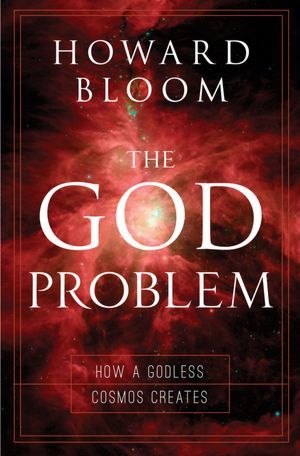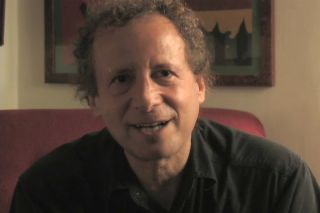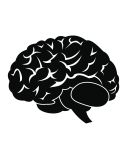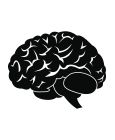Religion
The God Problem: An Interview with Howard Bloom
How does the universe account for its own creation?
Posted August 28, 2012

Interview by Jonah Comstock
Howard Bloom believes in two rules of science: Find the truth at any price—even your life—and look at the things right under your nose as if you've never seen them before.
True to the second rule, his books examine everything from bees to theoretical physics to the music industry. Is there a common thread? Insects, evolutionary particles, and pop stars, Bloom argues, are all driven by the same elemental thirst for attention and communication.
In Bloom's newest book, The God Problem: How a Godless Cosmos Creates, he takes readers through a history of scientific thought that's filled followers of his second rule—people like Albert Einstein, who took the cornerstones of science, long considered inviolable, and turned them on their heads.
Drawing on this history of paradigm shifts, Bloom suggests a new way of thinking about the universe in which the same patterns of relationships are expressed in particles, people, and societies. This profoundly social nature, Bloom says, can look a lot like God.
Psychology Today caught up with Bloom on his daily walk through Prospect Park.
If you drop the idea of a God, you argue, then the universe itself—the cosmos—is responsible for its own creation. Is that what's at the heart of the book?
The book is about how the cosmos creates. That's really the big question. How does a cosmos without a bearded, bathrobed God in the sky pull off all the things that a bearded, bathrobed guy in the sky was supposed to have pulled off? If there was no God who said “Let there be light,” where did we get all that light?
The book is called The God Problem, but God doesn't show up very much in it. Is this a fundamentally atheistic book?
It isn't. It's not at all. Because if you believe in God, it is a book about the language of God. It was Galileo who said God leaves us his language in two different forms. The inaccurate form is the scriptures, which is a bunch of propaganda written to appeal to the simple minds of the people. So there's a lot of fudging in the scriptures. But one thing God never fudges with is the laws of nature. So by understanding the laws of nature you understand the mind of God. And Einstein felt the same way. So did Kepler, so did Newton.
But for you?
I'm a stone-cold atheist. [But] there's another aspect to the atheism in this book. Right now Richard Dawkins, Christopher Hitchins, Sam Harris, and Daniel Dennett have produced a new form of atheism: militant atheism. Intolerant atheism. Atheism that says all the evils in the world can be ascribed to religion and if we wiped out religion we'd get rid of the evils. God damn. Why do intelligent men turn into inquisitors? Why do intelligent men within science sometimes turn into the propounders of dogma? Of new catechisms? Because that's what Richard Dawkins has done. He's made himself the pope of a new church.
I believe in tolerant atheism, I believe in pluralistic atheism, I believe in hitting realities with as many different sets of assumptions as you can, and then using what you get and pulling it into science and then seeing how science deals with it. But without a multiplicity of ways of thinking, we wouldn't have the benefit of doing science.
Sometimes, when writing autobiographically, you use the second person: “when you were 10 years old,” “you're Jewish today.” Why did you use that device?

Sometimes, when writing autobiographically, you use the second person: “when you were 10 years old,” “you're Jewish today.” Why did you use that device?
Einstein grabbed me by the lapel when I was 12 years old and he said, “To be a genius, it is not enough to come up with a theory only three men in the world can understand. To be a genius you have to be able to express it so clearly that anyone with a high school education and a reasonable amount of intelligence can understand it.” Those were my marching orders since I was 12: Write compellingly and deliciously.
If I tell this as stories about me, the people I'm writing this for are going to tune out because it sounds hopelessly egocentric. But if I put them in my shoes and I can make sure that they show up in every other sentence, whammo, all of a sudden what looked hopelessly egocentric looks vivid.
And I don't just put you in my shoes. I put you in the shoes of a Mesopotamian, I put you in the shoes of an Egyptian, I put you in the shoes of a Greek philosopher, I put you in the shoes of a proton and an electron. I put you in every pair of shoes I can possibly find. It's a big shoe store out there.
Does the science in the last part of your book—where you talk about particles with free will—start to become almost religious?
The real area in which this book gets a little religious is in dealing with what Einstein called Spinoza's God. That is, everything here is God in some way. Whether we're atheists or not, if there were a God, this is it. The bench is it, the ground is it, the sky is it, and the experiences we can have, the awe of it, are so close to divinity that it's ridiculous. Because divinity is a subjective state. Divinity is an emotion of being lifted out of yourself and being part of something much bigger than yourself that makes you go “Oh my God.” And that sense of awe? It's the second rule of science. And hopefully the book gives you some of that.


